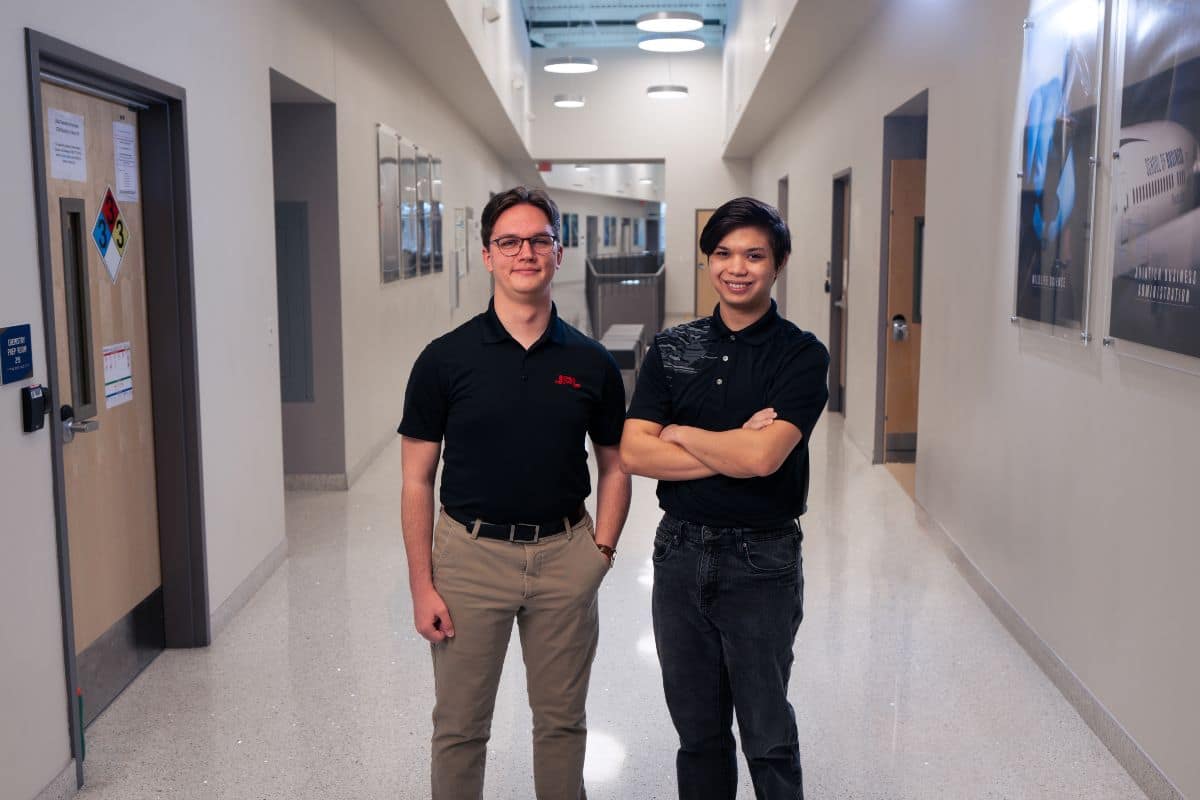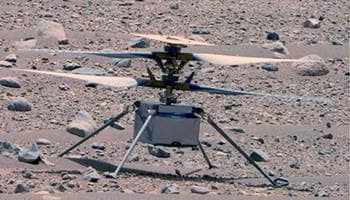At NASA’s Jet Propulsion Laboratory, Embry-Riddle Students Defend Space Systems From Cyberthreats

Two Embry-Riddle students have collaborated with NASA investigators on efforts to protect space operations — the next frontier in aerospace cybersecurity.
Michael Boehm and Justin La Zare, who are both National Science Foundation (NSF) CyberCorp Scholarship for Service recipients, worked on projects at NASA’s Jet Propulsion Laboratory in California. Boehm explored satellite cybersecurity vulnerabilities, while La Zare focused on risks posed by artificial intelligence tools.
Dr. Krishna Sampigethaya, chair of the Cyber Intelligence and Security Department and principal investigator for the CyberCorp Scholarship for Service program at the Prescott Campus, praised Boehm and La Zare’s efforts.
“Michael and Justin’s collaborations with NASA’s Jet Propulsion Laboratory exemplify the high-quality research and leadership our students, department and Scholarship for Service program demonstrate,” he said.
Securing Satellites
Boehm, who is earning a bachelor’s degree in Cyber Intelligence and Security and will graduate in 2026, analyzed the F Prime flight software framework used in spacecraft operations, identifying potential cybersecurity vulnerabilities. Such vulnerabilities could allow attackers to cause satellite software to crash and seize control of satellites, he said.
“If you can communicate with a device, so can an attacker,” said Boehm, who presented his research at the Small Satellite Conference in Logan, Utah, in 2024.
Boehm collaborated with NASA scientists to address these risks by developing security measures, such as command authentication and encrypted communication channels. Boehm’s efforts also improved memory management within the system, and he optimized testing procedures to identify and fix potential weak points.
“Michael demonstrated sophisticated technical understanding and exceptional hands-on problem-solving capabilities while addressing complex spacecraft security challenges,” said Dr. Arun Viswanathan, a senior cybersecurity researcher at the Jet Propulsion Laboratory. “The caliber of research emerging from Dr. Sampigethaya’s lab underscores the readiness of his students to make significant contributions to aerospace security.”
Boehm, who described the collaboration with NASA as both “challenging and immensely rewarding, said that the project “provided a unique opportunity to apply cybersecurity skills to space missions.”
Making AI Safe for Space

Graduate student Justin La Zare contributed to NASA’s Ingenuity Mars Helicopter during his work at the Jet Propulsion Laboratory. (Photo: NASA/JPL-Caltech/ASU/MSSS)
La Zare, a graduate student in Cyber Intelligence and Security, worked with the team at the Jet Propulsion Laboratory to mitigate cybersecurity risks in AI-enhanced space systems.
“Justin performed an impressive cybersecurity assessment with recommended improvements that determined the feasibility of autonomous operations of the Mars Helicopter,” said flight software engineer Steven Doran.
By developing a Large Language Model-based prototype, La Zare focused on protecting AI-driven tools from exposing mission details or generating misleading data to operators.
“The prototype I designed can be hosted internally, allowing for the use of sensitive mission documents,” La Zare said. “This system’s use of generative AI could potentially impact space operations.”
La Zare credited Embry-Riddle for preparing him to address these challenges. He said faculty mentorship has been an invaluable key to his success.
“Professors with industry experience pushed me to excel and gave me confidence for my first space mission cybersecurity project,” he said.
Doran, of the Jet Propulsion Laboratory, said he looks “forward to future collaborations with Dr. Sampigethaya and the students at Embry-Riddle in researching solutions for the many challenges in aerospace cybersecurity.”

 Keaton S. Ziem
Keaton S. Ziem